Inpatient Treatment Program
Our inpatient treatment program for addiction provides a safe, supportive, and therapeutic environment and comprehensive care. Also known as residential treatment, inpatient treatment offers numerous benefits that can make treatment more effective and reduce the need for future inpatient episodes.
We offer gender-specific treatment programs for adult men and women. These programs offer gender-informed programming and are housed in separate wings of our residential treatment center.
Please do not wait to get help.
Please call us at (720) 807-7867 or use our HIPAA-compliant form to verify your insurance benefits for our inpatient treatment program. An informed team member is ready to answer any questions and help you get started.
What is inpatient treatment for drug and alcohol addiction?
Inpatient treatment is when clients live at a treatment facility while receiving care. Inpatient (or residential) treatment facilities combine living accommodations and clinical environments so that clients do not have to leave the facility during treatment.
Foundry Front Range offers inpatient treatment in a modern, beautiful facility where clients live comfortably while engaging in comprehensive treatment surrounded by skilled team members and supportive peers.


A PERSONAL PERSPECTIVE ON THE VALUE OF INPATIENT TREATMENT
“Over thirty years as a behavioral healthcare specialist, I have found that inpatient treatment, for some patients, can be significantly more effective than outpatient levels of care. When patients can step away from their home environments, they often realize that the places and situations they are used to are enabling their addictive behaviors and problematic substance use. A quality residential program provides the safety and focus to do deeper work and the crucial ability to stay sober for at least a month or longer.
People experiencing substance use disorders really need the time to find their baselines by being completely free of substances and stresses for a significant period before they can determine the underlying causes of their disease, see themselves and their challenges clearly, and learn the skills to feel normal and healthy without the use of alcohol and drugs.” — Foundry Front Range Chief Clinical Officer Jasmine Aranda
What are the advantages of inpatient addiction treatment?
A Recovery-Supportive Environment
Residential programs are safe, supervised facilities free from substances and designed to promote healing, learning, and wellness. Inpatient recovery programming makes it easier for clients to remain substance-free during treatment and reduces triggers that can lead to relapse. In some cases, a client’s home environment, social group, or workplace can be the source of stress or promote substance misuse. Inpatient treatment programs eliminate these stresses and allow clients to focus exclusively on their recovery.
Connected Detoxification & Residential Treatment
Foundry Front Range offers medically supervised detoxification and residential treatment in one inpatient facility, allowing clients to seamlessly transition from one stage of treatment to the next. Beginning residential treatment immediately after detoxification significantly improves treatment outcomes.
Treatment Team Access & Oversight
Residential treatment programs allow clients and clinicians to interact more regularly and frequently than outpatient treatment programs. More interactions between clients and care team members increase opportunities to identify and meet needs, discover helpful insights, and have meaningful conversations.
Peer Interaction & Support
Residential treatment programs offer clients the opportunity to meet and learn from people with similar life experiences and to establish lasting relationships. People have often formed life-long friendships with people they meet in residential recovery programs. Getting to know others committed to recovery can provide sources of mutual support.
Greater Treatment Productivity
Inpatient treatment allows clients to accomplish more treatment programming each day. Maximizing every day of a residential treatment episode can make a vital difference in outcomes. Residential program schedules can include more time for clinical therapy, family programming, psychoeducation, nursing and medication management, recovery-informed recreational activities, and more. Simply put, you can get more treatment accomplished when you live at the treatment facility.
Nutrition and Fitness Support
Substance use disorders often lead to poor nutritional habits, disordered eating, and poor physical health. Residential programs can provide high-quality nutrition and dietary counseling needed to restore physical health and teach clients how to eat more healthily. On-site supervised fitness centers allow clients to rebuild their bodies safely and may be able to identify and treat underlying sources of chronic pain through exercise.
Medical Prescribing and Optimization
When patients who use medications to control the symptoms of mental health disorders, reduce cravings, or manage other medical conditions are under the close supervision of prescribers, they have a better chance to optimize their medication regimen. The ability to meet with psychiatric prescribers and nurses easily and frequently allows a medication plan to be optimized during the treatment stay, improving the benefits of medication while reducing risks before a client leaves the residential care setting.
Facilitated Family Involvement
Family programming, which typically includes education and counseling, is part of a comprehensive recovery program. Families often play essential roles in the wellness of their members. Dysfunctional family systems may be part of the reason that individuals use substances, yet families can also be the greatest supporters of their loved one’s successful recovery. Trained family therapists can help clients and their family members determine how to facilitate lasting recovery or make decisions that are in the best interest of all family members.
Convenience
Inpatient drug and alcohol treatment programs are more convenient than outpatient programs for many people. While committing to a residential level of care requires time away from work, family, and other obligations, it eliminates the need to travel to and from treatment appointments and puts all aspects of treatment in the same physical environment.
Conditions Treated
We are a licensed behavioral healthcare provider offering evidence-based treatment for adult substance use and co-occurring mental health disorders.
Alcohol claims the lives of more people annually than any other substance. We are experts at helping people safely stop drinking alcohol and engaging in a comprehensive program of therapies to achieve sobriety and recovery.
Heroin, fentanyl, and other opioid addictions remain at epidemic levels. We offer comprehensive therapy, psychiatric prescribing, and anti-craving medication.
Substance Use and Co-Occurring Mental Health Disorders are also known as Dual-Diagnosis Disorders. It is very common for addiction to involve anxiety, depression, PTSD, bipolar personality disorder, psychosis, and other mental health disorders. Treating both conditions effectively is vital.
Stimulant overdose is a growing problem, especially as the supply is adulterated with fentanyl or other opioids. We offer extensive experience helping people experiencing methamphetamine and stimulant use disorder.
Benzodiazepines like Alprazolam (Xanax®),
Clonazepam (Klonopin®), Diazepam (Valium®), and Lorazepam (Ativan®) are medications typically used to treat anxiety but are often misused. Because suddenly stopping the use of benzodiazepines can be fatal, carefully supervised detoxification is needed.
Cannabis Use Disorder (CUD) is a growing problem nationwide. Studies indicate increasing rates of cannabis use disorder following teh legalization and commercialization of cannabis in recent years. Cannabis Use Disorder poses unique health challenges, including hyperemesis, psychosis, paranoia, and heart-health risks. A significant stabilization period may be required before clients with CUD are stable enough to engage in treatment programming. Foundry Front Range has specialized expertise in treating Cannabis Use Disorder.
Substance Use Disorders are very often accompanied by mental health disorders (so-called co-occurring mental health disorders). Clients may have mental health disorders before developing a substance use disorder, or they may develop mental illness resulting from substance use disorders. Some common co-occurring mental health disorders include anxiety, depression, borderline personality disorder, psychosis, oppositional defiance, anger, and guilt and shame. Individuals may also experience cognitive or thought disorders, which can be diagnosed through specialized screening.
Trauma and addictive disorders are inextricably linked. Whether someone has experienced an adverse childhood event (ACE) or traumatizing life events during adulthood, the symptoms of trauma can create a perceived need to self-medicate with alcohol or drugs. In most cases, trauma must be resolved or processed before clients are able to benefit from addiction treatment and achieve recovery.
Families are complex social units that may be sources of beliefs, stresses, and other factors that can lead to the development of addiction and mental health disorders. Studies also indicate that genetic inheritance can predispose individuals to addiction or mental illness. For this reason, getting a thorough family history can be helpful in assessing client needs.
Our Expert Treatment Team
We are home to some of the most talented and skilled behavioral healthcare providers.
An integrated team of doctors, nurses, psychotherapists, and case managers, in partnership with expert managers and support staff, gives our clients unmatched skill, experience, and compassionate alliance.

Jasmine Aranda
A Chief Clinical Officer with three decades of experience oversees every client treatment plan.

Michael Barnes
A veteran researcher, clinician, and author with forty years of experience guides the future of treatment.
tom walker
A veteran executive who understands how to make high-quality care more accessible ensures that teams and clients receive the resources needed to be successful.

ben cort
A nationally recognized policy advisor, author, and speaker remains focused on continuing growth, education, and advocacy.
Specialized Care Model
Our Trauma-Integrated Care Model — Making Inpatient Treatment More Effective
Our Trauma-Integrated Care Model was developed by Chief Clinical Advisor Michael Barnes, PhD, using more than forty years of direct care and research experience. Trauma-Integrated Care centers on the role that trauma plays in the development and perpetuation of substance use and co-occurring mental health disorders. Traumatic life experiences can have cascading negative impacts, including an inability to experience emotions, damaged relationships, excessive stress, depression, hypervigilance, and more. People with unaddressed and unresolved trauma can feel the need to self-medicate their symptoms with substances like drugs and alcohol or engage in other damaging behaviors. Additionally, living with active addiction exposes people to a greater risk of trauma.
The Trauma-Integrated Care Model goes further than conventional trauma-informed models of care by designing the entire treatment episode around emotional safety and reduction and resolution of trauma symptoms. Team members are specially trained to support clients experiencing traumatic stress, family education is provided, and sophisticated trauma therapies are used as a normal course of treatment at Foundry Front Range.

Watch Dr. Michael Barnes, PhD, give an in-depth presentation discussing the role of trauma and family systems in behavioral healthcare.
What Evidence-Based therapies does Foundry Front Range use?
- Cognitive Behavioral Therapy (CBT)
- Dialectical Behavioral Therapy (DBT)
- Motivational Interviewing (MI)
- Eye Movement Desensitization and Reprocessing (EMDR)
- Somatic Experiencing
- Gestault Therapies
- Art Therapy
What services are included in your inpatient treatment program?
We provide a comprehensive array of services to support physical, mental, and social recovery:
- Assessments & Screenings
- Nursing and Medication Management
- Individual Evidence-based Psychotherapies
- Nutritional Programming
- Life Skills Training
- Group Therapy Sessions
- Trauma Treatment
- Mindfulness Training
- Psychoeducation
- Self-Care & Wellness Programming
- Family Programming
- Case Management
- Recreational Activities
- Continuing Care Planning
- Gender-specific programs
Our Facility
Our Inpatient Treatment Center Location in Broomfield, Colorado
Our inpatient detoxification and residential treatment facility is located at 11952 Gray Street in Broomfield, Colorado. Broomfield is a beautiful suburb north of Denver. This convenient location is just a 30-minute drive from downtown Denver and the Denver International Airport.
Residential Treatment Accommodations
Our 44,000-square-foot facility is spacious, comfortable, and well-appointed. Clients enjoy large common spaces to meet with peers and relax, recreational areas, a fitness center, private clinical offices, group therapy rooms, a commercial gourmet kitchen that serves delicious and nutritious meals, and more.

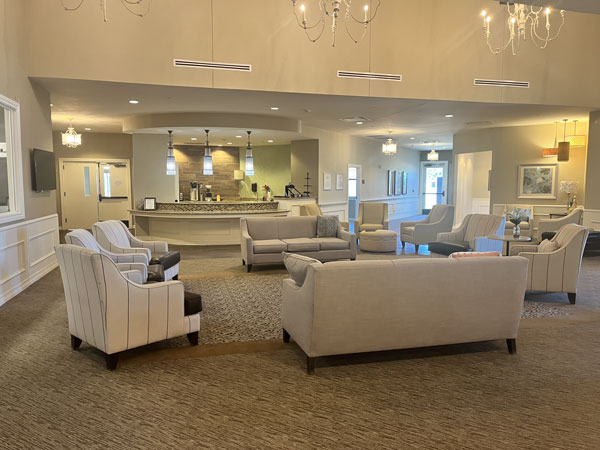

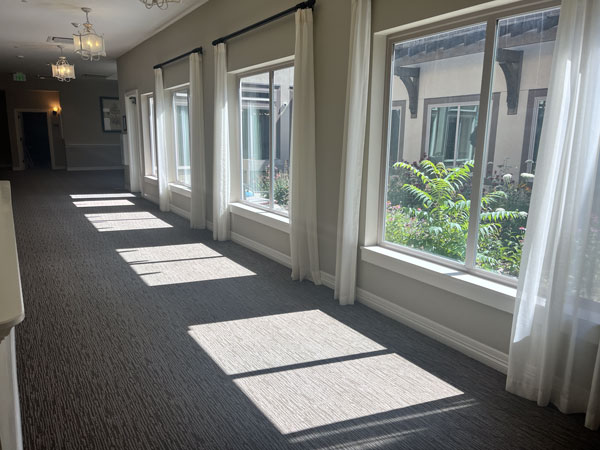

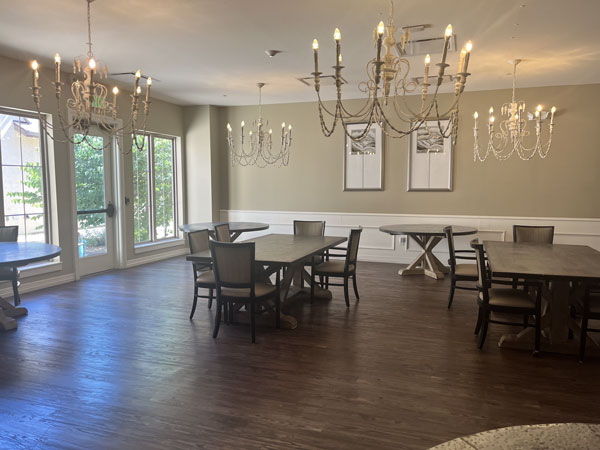
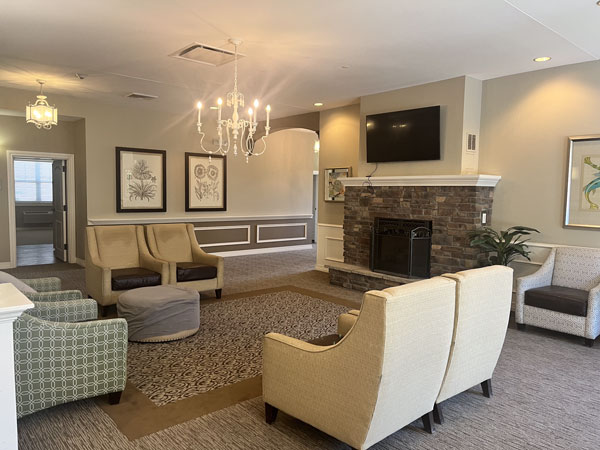
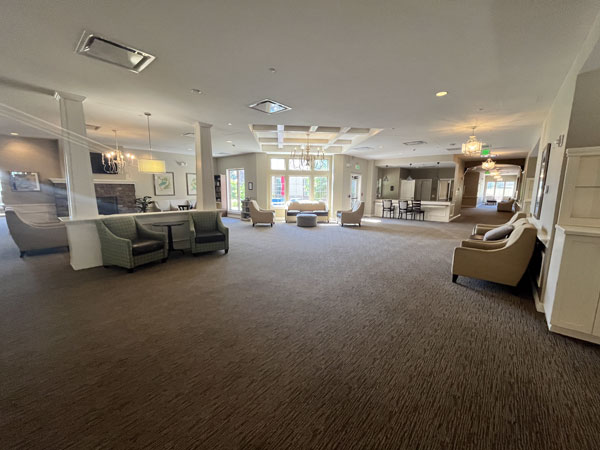

Inpatient Dining & Nutrition
Nutrition plays an important role in recovery. Living with active substance use disorders can deplete the body of vital nutrients, upset one’s metabolism, and lead to malnutrition. Learning to eat a healthy, balanced diet and rebuild a healthy relationship with food can bolster health and support recovery.
Foundry Front Range clients receive healthy and delicious meals and snacks prepared by professional chefs and informed by nutritional experts. We believe that good nutrition and a balanced diet are essential to building a healthy body and teaching clients how to support their ongoing well-being in recovery. Special diets can be accommodated with advanced notice. Meals are typically eaten together in the dining room, though clients may choose to dine privately.
What to Bring to Treatment
Here is a packing list of what you should bring for your inpatient treatment stay and what you should leave at home.
We ask clients to bring certain items and leave others at home to ensure a comfortable and safe experience for all clients.
What we provide for inpatient treatment clients:
- Towels
- Bed linens
- Laundry baskets
- Laundry soap
What you should bring with you for your stay with Foundry Front Range:
Clients are allowed to bring two bags containing the following belongings:
- Personal Identification
- Two weeks worth of comfortable, seasonably-appropriate clothing
- Sleepwear in line with dress code (no offensive language or slurs/innuendos)
- Toothbrush, toothpaste, shampoo/conditioner, deodorant (must be brand new/unused)
- Shaving razors (Electric Razor is preferred)
- Sturdy, comfortable shoes
- Gym shoes and workout gear in line with dress code
- Indoor shoes or slippers
- Any prescription medication that you are currently taking in original containers
- Step or recovery work you have done
- Cell Phone: Cell phones are not accessible while in the primary residential program but are
required to enroll in or transfer to aftercare programming - Up to three creams/gels, sealed in original packaging (Must be approved by the Foundry Front Range
physician) - Insurance card
- Legal paperwork, if applicable
What to leave at home:
- Illicit drugs and/or alcohol. Unauthorized medication will be confiscated upon admission
Tobacco products, nicotine patches - E-cigarettes or vapor pens
- Mouthwash, hand sanitizer, perfume or aftershave
- Jewelry
- Over-the-counter medications or supplements
- Laptops
- iPads or tablets
- Smart Watches (i.e., Apple Watch)
- MP3 players
- Aerosol containers (hairspray)
- Scissors or sharp implements
- Energy drinks, vitamin water, food items
- Weapons of any kind
- Expired medications
- Clothing that promotes drug or alcohol use
- Tank tops, short shorts, muscle shirts, any excessively revealing clothing

